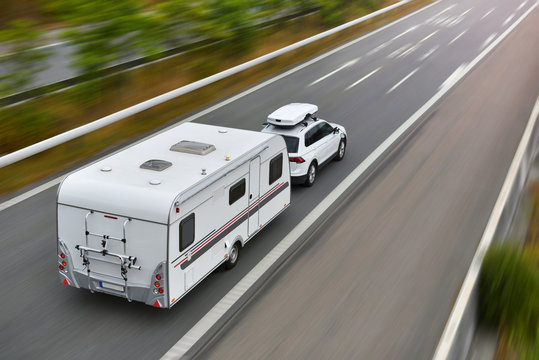Towing a trailer is a common practice for many drivers—whether for work, leisure, or moving. However, when towing a trailer, it is crucial to understand the legal requirements and responsibilities associated with it. Not exercising proper safety can result in personal injuries due to car accidents, tractor-trailer crashes, and other serious consequences.
In this article, we explore the legal guidelines, common mistakes, and advice on towing a trailer, especially as it relates to vehicle safety and liability.
LEGAL REQUIREMENTS FOR TOWING A TRAILER
When towing a trailer in Missouri, you are required to have it registered, securely hitched, have functioning lights, and you must abide my weight and braking regulations.
A. What is the Definition of a Trailer?
According to the Missouri Department of Revenue a trailer is a unit attached to and towed by a motorized vehicle designed to carry property and/or passengers. A trailer cannot be motorized or self-operable. A trailer may include (but is not limited to) the following:
- Homemade trailers;
- Kit trailers;
- Farm wagons;
- Boat trailers;
- Utility trailers;
- Flat bed trailers;
- Semi trailers;
- Livestock trailers; and
- Camping trailers.
B. Licensing and Vehicle Classifications
To tow a trailer legally, you must be properly licensed. Depending on the type of trailer, you may need a specific class of driver’s license. For example, you might require a commercial driver’s license (CDL) or a special endorsement if the total weight of the trailer and towing vehicle exceeds a certain threshold (often 10,000 pounds).
Key Considerations:
- Ensure your driver’s license classification aligns with the weight and type of trailer you’re towing.
- Make sure your vehicle is rated to tow the weight of the trailer.
C. Trailer Hitch and Equipment Compliance
Using the correct equipment is crucial when towing a trailer. This includes the proper hitch, brake systems, and wiring. In some areas, trailers with a certain weight must be equipped with working brakes and lights to be considered roadworthy.
Legal Essentials:
- Your trailer must have functioning brake lights, turn signals, and taillights that meet your local traffic laws.
- A brake controller may be necessary for heavier trailers.
- The hitch should be securely fastened to the towing vehicle, and the trailer should be level when connected.
D. Weight Limits
Many jurisdictions have weight limits that specify how much a trailer can weigh when being towed. This weight limit often includes the combined weight of the trailer and cargo. Overloading your trailer could lead to severe penalties or legal problems if you are involved in an accident.
Important to Know:
- Know your trailer’s weight capacity and ensure you’re not exceeding it.
- Check the towing capacity of your vehicle to ensure you’re within legal and safe limits.
COMMON LEGAL ISSUES AND MISTAKES WHEN TOWING A TRAILER
A. Improper Loading
Overloading or improperly distributing the load in a trailer can significantly impact driving safety and legality. An unbalanced load can cause a trailer to sway, increasing the risk of accidents. In addition to safety risks, improperly loaded trailers can lead to legal penalties.
Tip:
- Distribute the load evenly to avoid putting excessive weight on one side or the rear of the trailer.
B. Failure to Use Safety Chains
Many states require the use of safety chains in addition to the primary towing connection. These chains are designed to prevent the trailer from detaching from the towing vehicle if the hitch fails. Failure to secure safety chains can lead to fines and liability for damages in the event of an accident.
Legal Reminder:
- Always use the required safety chains and ensure they’re properly connected.
C. Inadequate Maintenance
Regular maintenance of both the towing vehicle and the trailer is crucial for safe operation. If your trailer’s brake lights or tires are worn out or malfunctioning, you may be cited or involved in an accident, which could lead to liability claims.
Recommendation:
- Perform regular inspections of your trailer and towing vehicle to ensure everything is in working order.
WHAT TO DO IF YOU ARE INVOLVED IN AN ACCIDENT WHILE TOWING A TRAILER
If you are involved in a collision while towing a trailer, you must follow the same steps as any other accident, but there are specific things you need to keep in mind:
- Assess the Situation and Ensure Safety
Make sure you are in a safe location, away from traffic. Check on the condition of those involved and call emergency services if necessary.
- Document Everything
Take photographs of the accident scene, the vehicles, and any visible damage. If the trailer caused the accident, note any mechanical issues or failure points.
- Contact Your Insurance
Notify your insurance company about the incident, even if you do not think you are at fault. Be transparent about the towing details, as some insurance policies have specific clauses for trailer-related accidents.
- Consult a Legal Professional
Depending on the circumstances, the legal consequences of a trailer-related accident can be complicated. Whether you are at fault or the other party is, it is essential to have legal counsel to help navigate the complexities of the case, especially if there are issues like faulty equipment, improperly secured loads, or questions of negligence.
WHY LEGAL REPRESENTATION MATTERS
If you have been injured due to someone else’s negligence involving a trailer, consulting a lawyer is critical. Our experienced personal injury lawyers can help you with:
- Understanding local laws and regulations about towing.
- Evaluating the causes and liabilities in a towing-related accident.
- Negotiating with insurance companies to ensure you are fully compensated for your damages.
For those who are involved in a trailer-related incident, our firm can provide you with valuable support.
